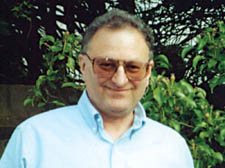|
|
 |
| |

Bernie Moss |
Historian, socialist, poet... the many lives of a man from the Bronx
HISTORIAN, economist and poet – Bernie Moss was all three in his lifetime.
Bernie, who died, aged 65, at his Hampstead home on Thursday, was an American academic who settled in Camden nearly 20 years ago and then became a focal figure in Hampstead Labour Party.
He was an author and economist who published three well-received books on French working-class history and EU economic policies as well as articles in leading academic journals, including the US radical publication, Science and History.
In a lecture at the Institute of Historical Research he revealed his own Marxist thoughts in a lecture of “The hidden Marxism in The Making of the English Working Class”(EP Thompson’s seminal work).
A year ago, while attached to London Metropolitan University, he delivered an astonishingly prescient lecture at the annual Political Studies Conference in which he predicted today’s “economic crash” and New Labour’s inability to deal with it.
Later, attracted by China’s “market socialism”, he was invited to a world conference of economists in Beijing and afterwards started work on a book on the new world power.
He did all this while battling depression following the death of his beloved wife Neysa, a fellow New Yorker, in 2003.
As a result, he joined Highgate Centre, set up for residents with mental health problems. When it was threatened with closure he led a successful deputation to Camden Council to keep it open.
Another surprising side of Bernie then flowered – a talent to write memorable metaphysical poetry, much of it published by the centre.
At his funeral on Sunday at the Western Synagogue Cemetery, Nataliya Vorontsova, a friend, said well-known Moscow poets had described Bernie as “very talented”. In his memory, she read a popular poem by Russian poet Myakovsky.
Bernie grew up in a radical Jewish family in New York’s Bronx – one grandfather had been a rabbi, another an active trade unionist.
His brother Frank, a New York union lawyer, told mourners on Sunday that in his teens Bernie won first prize for fiction out of 150,000 entries in a nationwide school competition.
He studied economics at Columbia University in New York and later taught at a university in California.
Drawn to the student revolt in Paris in 1968, he showed that, politics aside, he had a romantic soul. He persuaded his girlfriend Neysa to go with him to a village outside Paris where, by a riverbank, he proposed marriage.
In the 1980s he moved to Auckland University in New Zealand but eventually found it a “political backwater”, and settled in London.
Here he taught at an American college, and later at London Metropolitan University, while sinking himself in Labour politics.
He opposed New Labour from the start, demonstrated against the Iraq war and spoke at conferences of Left MPs and trade union radicals.
His son David said Bernie had shaped him in every respect, especially politics, and he would always be with him.
Hampstead Labour Party member Thomas Gardiner told mourners that, despite Bernie’s opposition to Blairism, he argued at every general election that the government should be supported.
A former Camden mayor, Ramen Bhattacharya, said Bernie would be remembered for his “high socialist ideals”.
Bernie was buried by his wife’s grave.
JOHN GULLIVER |
 |
|
|
 |
| |
| |
|
 |
|

